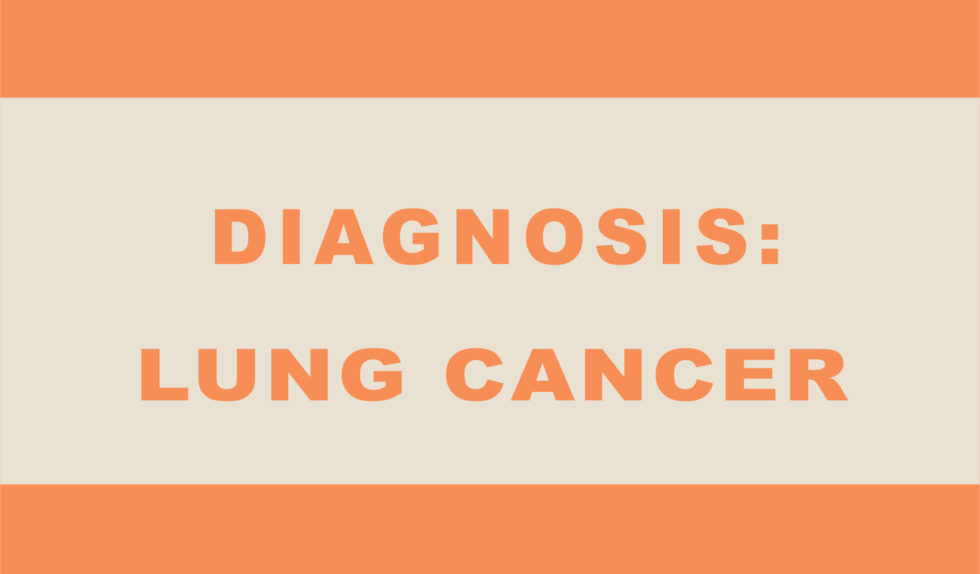DIAGNOSIS: Lung Cancer
5 Keys to Managing the Disease and Maximizing Your Quality of Life
A diagnosis of lung cancer can leave you and your loved ones feeling uncertain, anxious, and overwhelmed. You have important treatment decisions to make, emotional concerns to manage, and insurance and financial paperwork to organize, among other practical concerns. Here are five keys to help you manage the disease and maximize your quality of life.
1. Understand your diagnosis and treatment plan.
Lung cancer occurs when the cells in the lungs begin to change and grow uncontrollably, forming a tumor (also called a lesion or a nodule), which can be either cancerous or benign. The main types of lung cancer are small cell lung cancer and non-small cell lung cancer. Subtypes of non-small cell lung cancer are categorized based on the type of cell that the cancer originated in, and include adenocarcinoma, squamous cell carcinoma, and large cell carcinoma. The type of lung cancer that you have is an important factor in determining which treatments may work best for you.
There are a wide range of treatments for lung cancer. Chemotherapy and radiation are the main treatment options for people with small cell lung cancer. Surgery is rarely used for people with small cell lung cancer and is only considered for people with very early-stage disease. Treatment options for non-small cell lung cancer include surgery, chemotherapy, radiation, targeted therapies, and immunotherapy. If treatment is necessary, ask your healthcare team to recommend reliable publications and websites to help you learn more about your treatment options. Knowing what to expect can help you feel more in control.
Knowing what to expect can help you feel more in control.
2. Communicate with your healthcare team.
Because lung cancer is a complex condition with complex treatment options, good communication between you and your healthcare team is key. Your oncologist, nurses, and other members of your healthcare team work together to treat your lung cancer. Since medical appointments are the main time you will interact with your team, being as prepared as possible for these visits is important. It will help ensure that you understand your diagnosis and treatment, get answers to your questions, and feel more satisfied with your overall care.
3. Find resources.
While lung cancer can present many challenges, keep in mind that you do not need to cope with this diagnosis on your own. Your friends and family are important sources of strength and support. There are also many local and national support services available to assist you.
• Financial assistance There are many organizations that provide help with medical billing, insurance coverage, and reimbursement issues. There is also financial assistance available to help people who cannot afford the cost of their medications. Good places to start your research are the websites of A Helping Hand (CancerCare.org/helpinghand) and the Partnership for Prescription Assistance (pparx.org).
• Benefits and entitlements Local and county government agencies can give you information on Social Security, state disability, Medicaid, income maintenance, the Low Income Heating Energy Assistance Program (LIHEAP), and the Supplemental Nutrition Assistance Program (SNAP). Check your local phone directory for listings.
• Housing and lodging The Hope Lodge of the American Cancer Society, the National Association of Hospital Hospitality Houses (NAHHH.org), and other organizations provide temporary lodging for families of a person who needs to travel far from their home for treatment. Joe’s House (JoesHouse.org) is a nonprofit organization that offers an online database with lodging information near cancer treatment centers across the U.S.
4. Know your insurance coverage.
Understand ahead of time which treatments and medical services your insurance covers, and whether you are still responsible for any out-of-pocket expenses. A good first step is to contact your insurance company using the phone number found on the back of your insurance card.
5. Get emotional support.
Adjusting to and finding ways to cope with a lung cancer diagnosis is an important part of healing, along with treatment. There are many organizations, such as CancerCare (CancerCare.org), that provide support services to help people affected by cancer. Individual counseling is available to help you learn ways to cope with the emotions and challenges raised by your diagnosis. Support groups can connect you with other people in a similar situation in a safe, supportive environment. Cancer affects the whole person, and their loved ones, so it’s important to create a support network as part of managing your care.
A diagnosis of lung cancer is challenging, to say the least. However, if you make a point to learn about your diagnosis and its treatment options, communicate with your healthcare team, take advantage of the resources available to you, and surround yourself with a support network, you will be better able to manage your lung cancer and experience a better quality of life.
CancerCare offers free face-to-face, telephone, and online support groups led by professional oncology social workers. To get free fact sheets or to learn more, call (800) 813-4673 or visit CancerCare.org.
Reprinted with permission from cancercare.org.
This article was published in Coping® with Cancer magazine, November/December 2019.


